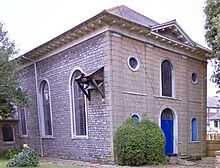Chichester Theological College
| Chichester Theological College | |
|---|---|
 Chichester Theological College | |
| Coordinates: 50°50′11″N 0°47′09″W / 50.8365°N 0.7857°W | |
| OS grid reference | SU8560604812 |
| Location | Chichester |
| Country | UK |
| Denomination | Anglican |
| Churchmanship | High Anglican |
| History | |
| Founded | July 1838 |
| Founder(s) | William Otter |
| Dedication | St Richard of Chichester |
| Dedicated | May 1 1919 |
| Associated people |
Charles Marriott William Otter William Awdry |
| Architecture | |
| Status | Closed |
| Heritage designation | Grade II Listed[1] |
| Designated | 5 July 1950 |
| Architect(s) | Ahrends, Burton & Koralek |
| Closed | 1994 |
| Administration | |
| Parish | St Paul's, Chichester |
| Archdeaconry | Chichester |
| Diocese | Chichester |
| Province | Canterbury |
Chichester Theological College (1838-1994) was an Anglican theological college for the Diocese of Chichester in Sussex, England.[2]
History
It was founded by William Otter in July 1838, the first such Diocesan college in England. Charles Marriott of Oriel College, Oxford was its first principal and the first donation, of £50, for the college was from W. E. Gladstone.[3]
From 1886, during Josiah Sanders Teulon's time as principal, the college experienced a gradual decline in students. This was exacerbated in 1899, when he resigned, but retained his income as a resident canon. At a meeting of the college council, it was resolved to close the college. However, the vice-principal made a successful case for continuing and Herbert Rickard was appointed the new principal.
In 1903, a hostel in West Street, Chichester was bought for £1000 by the college council, the balance being paid by the principal in memory of his wife. This was refitted and became the college headquarters. This hostel was sold in 1919 and the proceeds went towards the purchase of new headquarters in Westgate, Chichester for £3500. On May 1st 1919 the college was formally re-opened by Bishop Charles Ridgeway (his last episcopal act) and was dedicated to St Richard of Chichester.
During the Second World War the college was forced to move temporarily to Cambridge, while its buildings in Chichester were used by the military authorities. At the end of the War, the college buildings were sold, except for Marriott House, which was used to house the re-opened college from 21st October 1946.[4]
Closure
After its closure in 1994, its theological library was transferred to the University of Chichester.[5] In addition, St. Bartholomew's Chapel, which served as the chapel to the theological college is now the Chaplaincy building of Chichester College.[6]
List of Principals
- 1838: Charles Marriott, supporter of the Oxford Movement
- 1842: Henry Browne, English classical and biblical scholar
- 1846: Philip Freeman, scholar and Archdeacon of Exeter
- 1854: C. A. Swainson[7]
- 1870: Arthur Rawson Ashwell, writer, preacher, teacher and canon residentiary of Chichester Cathedral[8]
- 1879: William Awdry, the first Bishop of Southampton
- 1886: Josiah Sanders Teulon.[9]
- 1899: Herbert Rickard until 1918[10]
- 1919: Herman Leonard Pass, reopened the college after the First World War[11]
- 1933: Charles Scott Gillett[12]
- 1946: John Moorman, Bishop of Ripon from 1956 to 1975
- 1956: Cheslyn Jones[13]
- 1971: Alan Wilkinson[14]
- 1975: Robert John Halliburton[15]
- 1982: John Hind, Bishop of Chichester[16]
- 1991: Peter Atkinson, Dean of Worcester.

Notable alumni
- James Ayong (born 1944), Archbishop of Papua New Guinea
- Paul-Gordon Chandler (born 1964), Episcopal priest and author
- Barry Curtis (born 1933), Bishop of Calgary and Metropolitan of Rupert's Land
- Edwin Dodgson, missionary
- John Ford (born 1952), Bishop of Plymouth
- Arthur John Hawes (born 1943), Archdeacon of Lincoln
- Christopher Hewetson (born 1937), Archdeacon of Chester
- Roger Jupp, Bishop of Popondetta
- Morris Maddocks (1928–2008), assistant bishop in the Diocese of Chichester
- David Nicholls, theologian
- Ernest Raymond (1888–1974), novelist
- David Rossdale (born 1953), Bishop of Grimsby
- Oswald Trellis, Dean of St George's Cathedral, Georgetown
- Victor Whitechurch, writer of detective fiction
References
- ↑ British Listed Buildings
- ↑ The Burgon Society
- ↑ "Rt. Rev. William Otter - CNHS's Web Site". Colmworthhistory.org.uk. Retrieved 2012-08-12.
- ↑ National Archives
- ↑ "Special Collections | University of Chichester". Chi.ac.uk. Retrieved 2012-08-12.
- ↑ http://www.churches-uk-ireland.org/towns/c/chichester.html Status of churches in Chichester
- ↑ "Access to Archives". The National Archives. Retrieved 2012-08-12.
- ↑ "An early history - ST BARTHOLOMEW BRIGHTON". Stbartholomewsbrighton.org.uk. Retrieved 2012-08-12.
- ↑ Denis Larionov & Alexander Zhulin. "A history of Pembroke college, Oxford, anciently Broadgates hall, in which are incorporated short historical notices of the more eminent members of this house, by Douglas Macleane". Ebooksread.com. Retrieved 2012-08-12.
- ↑ "Page 32". Ccel.org. Retrieved 2012-08-12.
- ↑ "Full text of Alumni Cantabrigienses; a biographical list of all known students, graduates and holders of office at the University of Cambridge, from the earliest times to 1900". Archive.org. Retrieved 2012-08-12.
- ↑ Scottish Episcopal Clergy, ed. Bertie, David (2001). Continuum Publishing. ISBN 0567087468
- ↑ Kemp, Eric (2006). Shy But Not Retiring: Memoirs. Continuum Publishing. ISBN 978-0826480736
- ↑ "Bishop Clark Discusses Statement On Ministry - from the Catholic Herald Archive". Archive.catholicherald.co.uk. Retrieved 2012-08-12.
- ↑ "John Halliburton". Trushare.com. Retrieved 2012-08-12.
- ↑ "John Hind (Lord Bishop) | University of Chichester". Chi.ac.uk. Retrieved 2012-08-12.
External links
| |||||||||||